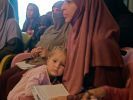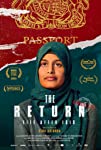Eye For Film >> Movies >> The Return: Life After ISIS (None) Film Review
The Return: Life After ISIS
Reviewed by: Amber Wilkinson

The news headlines might have largely moved on from stories of the conflict in Syria and Islamic State, but as this news documentary, chiefly shot in the Roj refugee camp in the north-east of the country shows, moving on is not something that many of the 1500 ISIS brides and their children who live there are being allowed to do, even if they want to - as countries across the globe are denying their citizenship.
The most familiar face in Alba Sotorra Clua's film, at least to a British audience, is that of Shamima Begum. The Londoner first made headlines as a 15-year-old when she ran away with two of her school friends to join the ISIS Caliphate in Syria and returned to them in 2019 when she was located, nine months pregnant and her friends already dead, in the refugee camp. US viewers, meanwhile, will recognise the name of Hoda Muthana, who also fell for the extremists' propaganda as a teenager and headed to Syria. Others also give their testimony here, including young women from Germany and the Netherlands.

Clua's film combines footage of the day-to-day of the camps, including group sessions for the women to talk about their experiences, with direct-to-camera interviews fleshing out their back stories alongside archive newsreel and propaganda films, to fill in background while maintaining her pace. The camera also pays attention to the children - none more than about five years old - as they play, prompting us to consider their position in the political machinery now at work.
Although the women have different homelands, there are striking similarities in what has happened to them. All express feelings of loneliness prompting the move towards ISIS. Begum describes herself as being like a "black sheep of the family", while another interviewee notes, "All I wanted was to be a part of something" and an older Canadian woman, Kimberly Pollman, tells how her isolation stemmed from being an "empty nester". While not denying the complexity of the situation, the film shows how these women were, mostly, groomed online only to discover on arrival in Syria that far from paradise, it was a "hell on earth" and the only way out of the cramped conditions of the "madafas" - basically group houses for women - was to marry. Even then, a life of grim servitude generally awaited - although it's clear some of the women still have strong attachments to their husbands.
The vestiges of Begum's childhood are still evident in the way she recalls being unable to cook at that point and telling her husband, "What do you expect when you marry a 15-year-old". She has, in many ways, lived through more than many in a lifetime in the 19 years she begins this film with, losing all three of her children, so it's little wonder there's a feeling of shellshock to her interviews, as though even she can't quite wrap her head around all that has unfolded in the past handful of years. Clua shows an eye for considering the situation in the round, also taking time to talk to Kurdish women's rights activist Govinaz Evdike, who is helping the women work through their trauma, even though she herself lost loved ones to ISIS. "It's our duty to help the fallen," her father says philosophically, a reminder that the real heroics in life are often unseen acts of forgiveness like this.
There is no doubting whose side Clua is on in all this, emphasising the abuse the women have suffered from the off, something which, in effect, governments are now doubling down on by denying their citizenship. It could be argued, however, that her compassionate stance offers a counterweight to the way their stories are often presented by the populist press, with the women given an opportunity to express their experiences more fully. There may be no easy answers here but the overwhelming sense is that keeping these women, and particularly, their children in permanent limbo cannot be the solution.
Reviewed on: 10 Jun 2021
















